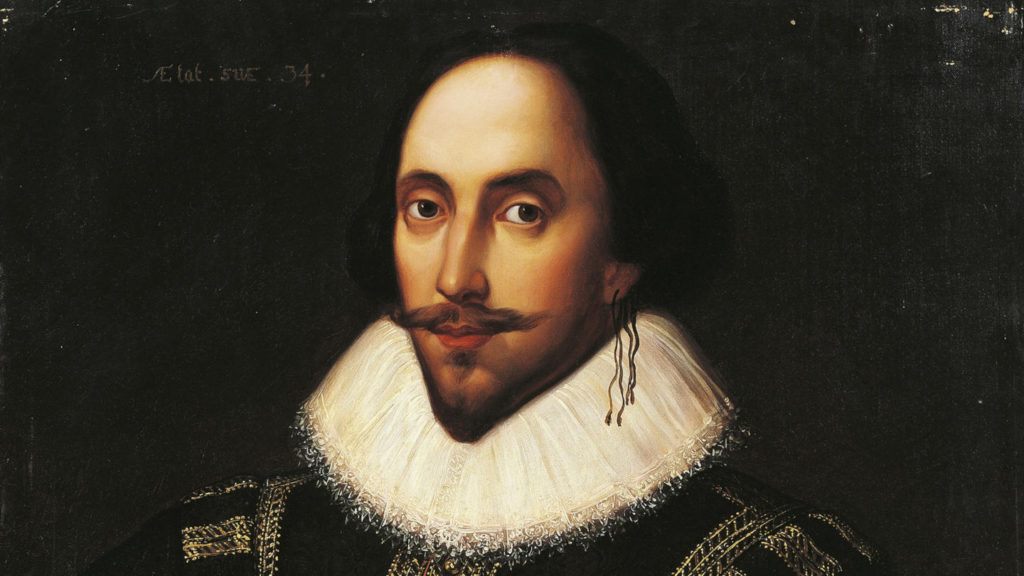Table of Contents
SHAKESPEARE AT THE MOVIES
For those who lack ready access to Shakespearean theater, there’s a lot of superb Shakespeare available on video. See, for example, the (enormous) Internet Movie Database Shakespeare film list. (Be warned: concerned parents should screen movies in advance. Shakespeare interpretations range from the mild to the gory; and in Roman Polanski’s 1971 version of Macbeth – telling known as the “Nude Macbeth” – the Lady sleepwalks without jammies.)
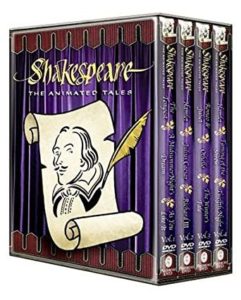 |
Shakespeare: The Animated Tales is an award-winning series of short (about half an hour) animated adaptations of Shakespeare’s plays, originally aired on television between 1992 and 1994. A 12-play collection is available on DVD. |
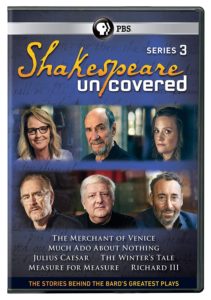
|
Shakespeare Uncovered is a series of six films combining history, biography, performance, and dramatic analysis of Shakespeare’s plays with such famous presenters as Ethan Hawke, Jeremy Irons, and Derek Jacobi. Included at the website is a quiz to determine which Shakespearean character you are and a series of interactive games, among them “Death and Dying in Hamlet and Macbeth” and “Shakespeare’s Enchanted Forest.” |
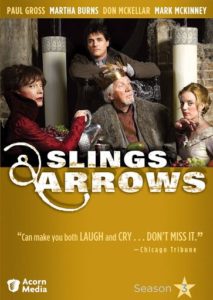
|
The TV series Slings and Arrows (2003-2006) is the story of Geoffrey (Paul Gross), a director recovering from a nervous breakdown, who is tasked with revitalizing a dystopic Canadian theater festival. In each of the three seasons of the miniseries the festival puts on a different Shakespearian play (“Hamlet” for season one, followed by “Macbeth” and “King Lear”), and the characters come to understand the facets of their own lives through the lens of the dramas they perform. The first season is the strongest, with the most direct Shakespearian parallels to the characters lives, but the series is a must-watch for anyone interested watching ins-and-outs of how Thespians make the sausage. [Guest reviewer Josh Rupp. Thanks, Josh!] |
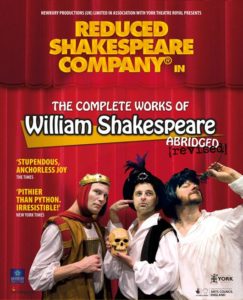 |
Impatient? Check out The Complete Works of Shakespeare (Abridged) by the Reduced Shakespeare Company. Thirty-seven plays in under two hours. And it’s hilarious. |
| A few movie highlights: | |
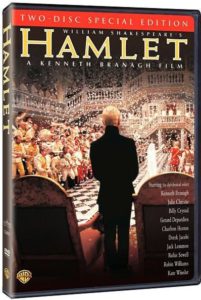 |
Kenneth Branagh’s 1996 version of Hamlet is cinematically spectacular. Branagh plays Hamlet; Kate Winslet, Ophelia. The production is four hours long, but it doesn’t feel like it. Rated PG-13. |
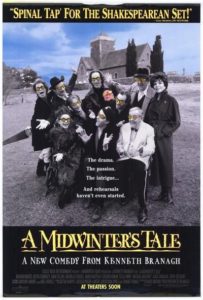 |
Directed by Kenneth Branagh, A Midwinter’s Tale (1995) is the story of out-of-work actor Joe Harper who – in a effort to stave off depression – volunteers to help save his sister’s church from land developers by staging a Christmas production of Hamlet. A romantic comedy with a caste of oddball British characters. Rated R. |
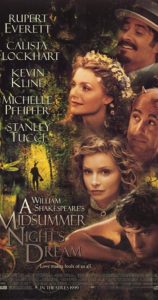 |
The entrancing 1999 version of A Midsummer Night’s Dream is set somewhere around the turn of the century; the confused lovers ride bicycles through the forest. Kevin Kline plays Nick Bottom, complete with donkey ears; Michelle Pfeiffer, Titania; and Stanley Tucci is a terrific Puck. Rated PG-13. |
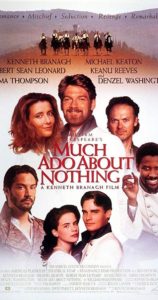 |
Kenneth Branagh plays Benedick, in a delightful 1993 production of Much Ado About Nothing, with Emma Thompson as a very witty Beatrice and Michael Keaton as a notably dippy Dogberry. Rated PG-13. |
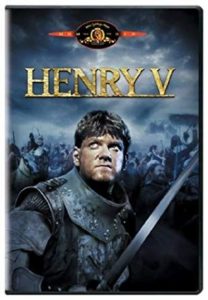 |
In this great version of Henry V (1989), Kenneth Branagh plays Henry, with Emma Thompson as the French king’s daughter, Katherine. There’s a phenomenal Battle of Agincourt. Rated PG-13. |
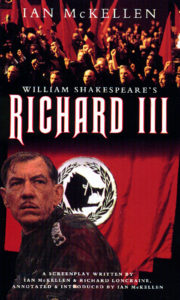 |
In this 1995 production of Richard III, the play is set in the 1930’s; Richard (Ian McKellen) is a uniformed dictator; and the final battle features airplanes and guns. Rated R. |
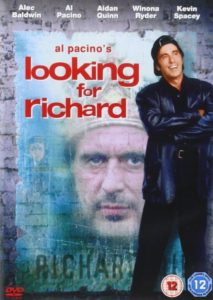 |
Looking for Richard (1996) is a fascinating documentary-style account of the staging of the Richard III in which Al Pacino and cast dissect, discuss, and experiment with all aspects of the play. Rated PG-13. |
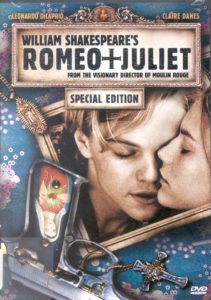 |
Among the most popular of Romeo and Juliets is the 1996 version starring Leonardo DiCaprio and Clare Danes; if you’re not a fan of Leonardo, try Franco Zefferelli’s 1968 Romeo and Juliet, with Leonard Whiting and Oliva Hussey. Rated, respectively, PG-13 and PG. |
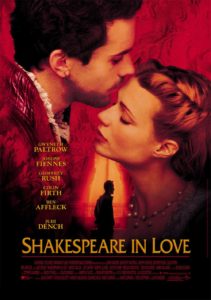 |
In Shakespeare in Love (1998), Shakespeare (Joseph Fiennes) struggles to write the play that ultimately becomes Romeo and Juliet. He’s in love with Viola (Gwyneth Paltrow); the supporting case includes Judi Dench, who plays a marvelous Queen Elizabeth, and Geoffrey Rush as a harried theater manager. Rated R. |
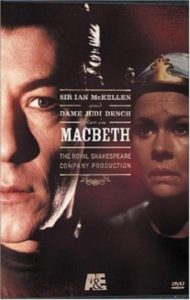 |
In Trevor Nunn’s 1978 Macbeth, Ian McKellen plays Macbeth and Judi Dench, his manipulative Lady, with a cast of supporting characters from the Royal Shakespeare Company. |
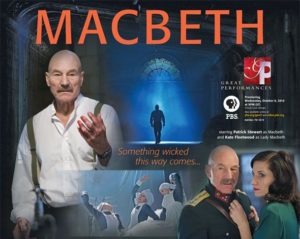 |
Macbeth (2010) with Patrick Stewart and Kate Fleetwood is a Stalinesque version of the play, with the three Witches as a trio of creepy hospital nurses. Not rated, but for older viewers. |
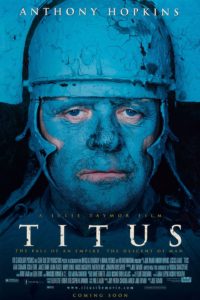 |
Directed by Julie Taymor, Titus (1999) – a film version of Titus Andronicus, with Anthony Hopkins in the title role and Jessica Lange as Tamora – is terrific. Rated R. |
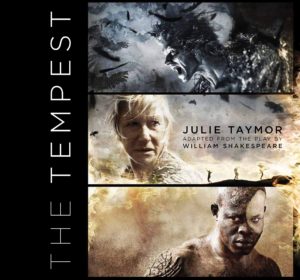 |
In Taymor’s The Tempest (2010), a plot twist is a gender change: Prospero is Prospera, played by Helen Mirren. Rated PG-13. |
